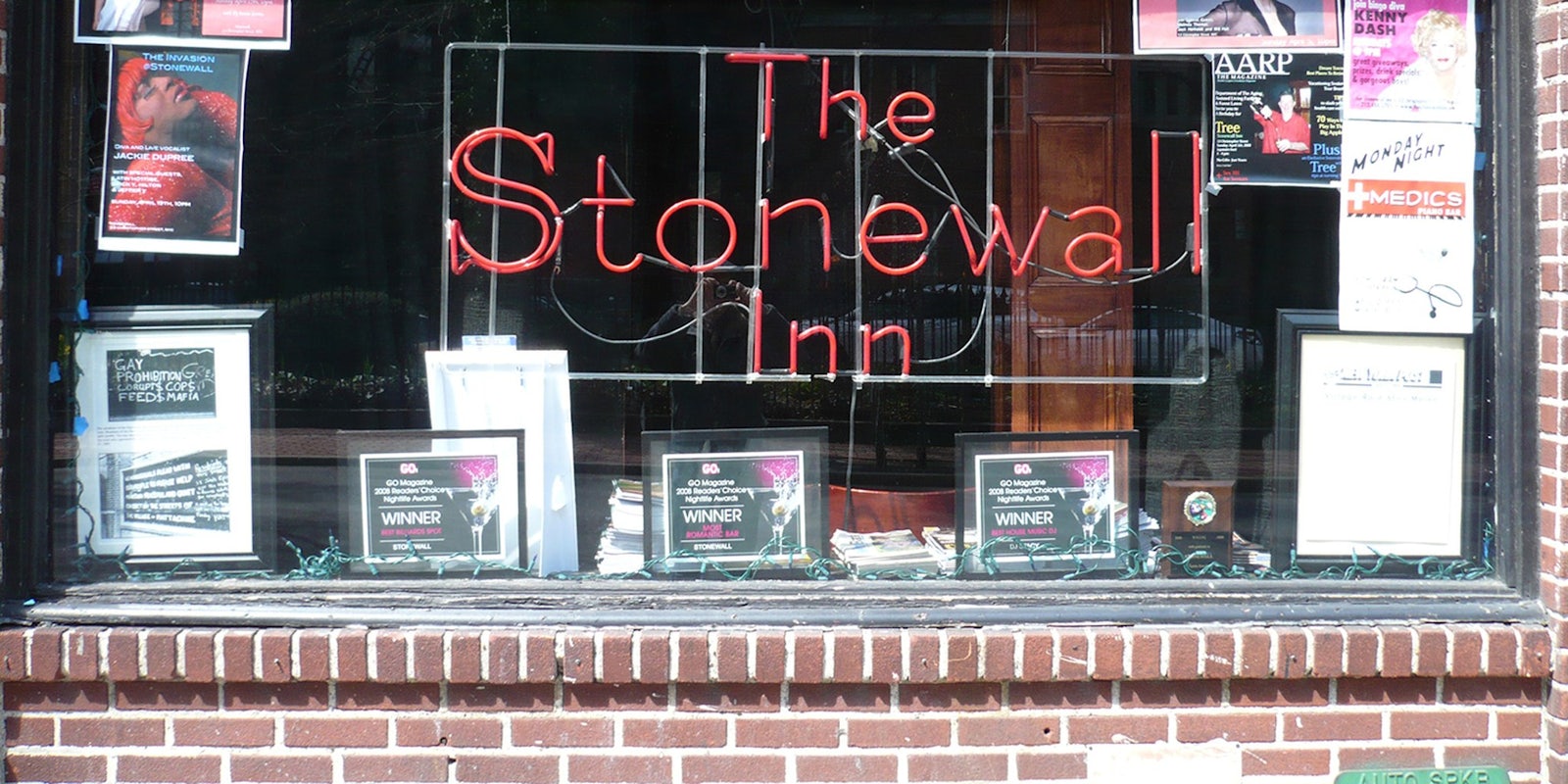This weekend marks the annual New York City pride celebration, when the LGBT community and allies march down Fifth Avenue in a series of parades culminating in sweaty Bacchanalian dance parties.
It’s the perfect time, then, for the city to unanimously approve official landmark status to the Stonewall Inn—that capitol building of gay culture located on Christopher Street in the city’s West Village.
The status was granted on Tuesday morning after a packed public hearing of the Landmarks Preservation Commission, at which several LGBT New Yorkers read statements about the historic value of the bar.
“It ain’t a pretty building. It ain’t a pretty piece of architecture. But this building represents so many things and in light of the recent events in Charleston, I am continually reminded that someday, we will be all more human,” said Landmarks Preservation Commission member Michael Devonshire, according to Newsweek. “Someday, we will understand that color, race, and sexual orientation is something to be applauded and included in our family of man. This fantastic spot represents that period of strength and dignity for the LGBT community that absolutely deserves our resignation and protection.”
The Stonewall’s reputation as the birthplace of the gay-rights movement has already been concretized in history in countless books and documentaries. In fact, the reason LGBT-pride celebrations typically take place on or around June 28 is because that was the date of the first night of the Stonewall riots in 1969. This year marks the 46th anniversary of the riots.
Throughout the 1950s and 1960s, gay culture was an extremely hidden, underground subculture by necessity. Discrimination was so rampant that if a person was discovered to be gay, lesbian, bisexual, or transgender, they could be sentenced to time in prison, committed to a mental institution, and lose everything. Members of the community met secretly in bars, the only places where they could dress comfortably and meet other people like themselves.
Police raids on the bars were common. Everyone knew that gay bars existed, but it was both illegal to serve alcohol to LGBT people and illegal for same-sex couples to dance together. Women and men were mandated to wear at least three pieces of clothing that “matched” their assigned gender—if someone was discovered wearing too much opposite-gender clothing, they could be arrested.
According to the Stonewall Inn website, the crowd gathered at the inn on June 28, 1969, was simply fed up with the police raids. Tensions had been brewing for some time and finally broke that night.
A scuffle broke out when a lesbian in handcuffs was escorted to the police wagon. She fought with the police, and was hit in the head with a billy club for complaining that her handcuffs were too tight. An officer then picked her up and heaved her into the back of the wagon. That was the last straw for the already tense crowd. The crowd tried to overturn the police wagon. Pennies, then beer bottles, were thrown at the wagon, then bricks. The police were then outnumbered by about 600 people. Ten police officers barricaded themselves inside the Stonewall Inn for their own safety. Garbage cans, bottles, rocks, and bricks were hurled at the building, breaking the windows. A parking meter was uprooted and used as a battering ram on the doors of the Stonewall. The Tactical Police Force of the New York City Police Department finally arrived to free the police trapped inside the Stonewall, and with the larger police force they then detained anyone they could and put them in patrol wagons to go to jail.
According to several eyewitness accounts, it was a black transgender woman, Marsha P. Johnson, who officially kicked off the riot on that first night. Johnson is said to have thrown a shot glass against the wall, which is sometimes referred to as “the shot glass heard around the world.” In the documentary Pay It No Mind: The Life and Times of Marsha P. Johnson, she was referred to as a “patron saint” and one person interviewed described meeting her as a “religious experience.”
“When I think of Marsha P. Johnson, I think of someone who kids today who are gay know nothing about. Which is a shame, really,” said Michael Lynch in the film. “Because she’s one of the reasons they are sitting in all their liberated glory today. But Marsha paid the price for who she was.”
The Stonewall Inn’s new landmark status means the building cannot be altered or torn down. Though Johnson died in 1992 due to what many believe was a murder, the landmark status newly granted to her favorite hangout seems a fitting postmortem tribute to the person the New York Daily News called “The mayor of Christopher Street.”
Photo via InSapphoWeTrust/Flickr (CC BY 2.0)


